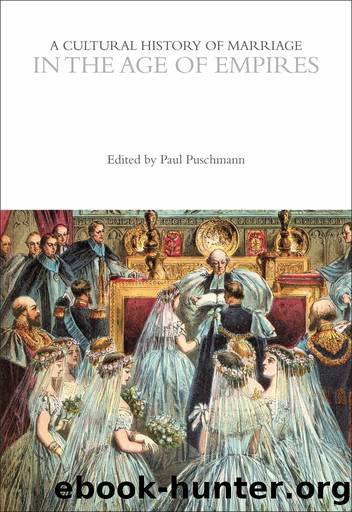A Cultural History of Marriage in the Age of Empires by Paul Puschmann

Author:Paul Puschmann [Puschmann, Paul]
Language: eng
Format: epub
ISBN: 9781350001893
Barnesnoble:
Publisher: Bloomsbury Academic
Published: 2021-11-04T00:00:00+00:00
FIGURE 5.7 Japanese Ainu family in front of their dwelling in the Department of Anthropology exhibit at the 1904 Worldâs Fair. Photography by Jessie Tarbox Beals, Missouri History Museum. Public Domain via Wikimedia Commons.
CONCLUSIONS
In the Age of Empires global economic change transformed the world inhabited by nineteenth-century families. The Industrial Revolution divided the world into continents characterized by economic progress and technological change, primarily located in northwest Europe and later on also the United States, and continents that were drawn into ever-growing global streams of commerce as markets of industrial inputs and selling markets for cheap industrial European products. Fueled by the revolutions in the production of cotton the United Kingdom became the worldâs leading industrial power early on in the nineteenth century. These first English factories were drawing in considerable numbers of children and women workers without whom the Industrial Revolution could perhaps not have borne fruit. In later stages of the English industrial development, and in particular when steel and electrical companies began to be the driving force of the industrial sector, adult men began to replace women and children as the dominant industrial workforce. Outside Europe and North America local markets changed work roles and productive relations, sometimes destroying traditional local handicraft industries, on other occasions creating new opportunities. These could, however, not prevent a further drifting apart of the continents, both in terms of economic development and technological change as well as in terms of the living standards of the large mass of working-class families.
In this process the economic make-up of families and households changed fundamentally. The Industrial Revolution transformed work relations, work rhythms, and labor discipline. It individualized the economic roles of parents, husbands and wives, and of children. Families became dependent on the anonymous powers of a global market that were capable of mercilessly destroying familiesâ earning powers and traditional ways of working and living. However, families were and remained pivotal in peopleâs lives and in their livelihoods. Families could help to âweather the stormâ of economic change and survive the pressures families experienced at various stages along the family cycle.78 For urban families who had become entirely dependent upon waged work, whether in the industrial or the artisanal sector of the economy, the first few years after the coupleâs marriage when both husband and wife could work earnings might be relatively plentiful. With larger numbers of very young children in the household it became more difficult for the wife to work full hours putting great strains on the family budget. Family affluence was built up when children began to bring in wages making up for the serious reduction in earning abilities of the male head of the household after age thirty-five. The waged work of the wife, who was paid significantly less than that of her sons, was substituted for work activities by the coupleâs offspring.
Labor force participation by children and adolescents was not seen as damaging the maleâs role of family provider; it rather testified to his ability to maintain discipline in the family.
Download
This site does not store any files on its server. We only index and link to content provided by other sites. Please contact the content providers to delete copyright contents if any and email us, we'll remove relevant links or contents immediately.
| Anthropology | Archaeology |
| Philosophy | Politics & Government |
| Social Sciences | Sociology |
| Women's Studies |
Nudge - Improving Decisions about Health, Wealth, and Happiness by Thaler Sunstein(7706)
The Fire Next Time by James Baldwin(5446)
iGen by Jean M. Twenge(5416)
Adulting by Kelly Williams Brown(4574)
The Sports Rules Book by Human Kinetics(4386)
The Hacking of the American Mind by Robert H. Lustig(4383)
The Ethical Slut by Janet W. Hardy(4253)
Captivate by Vanessa Van Edwards(3839)
Mummy Knew by Lisa James(3691)
In a Sunburned Country by Bill Bryson(3542)
The Worm at the Core by Sheldon Solomon(3487)
Ants Among Elephants by Sujatha Gidla(3467)
The 48 laws of power by Robert Greene & Joost Elffers(3291)
Suicide: A Study in Sociology by Emile Durkheim(3022)
The Slow Fix: Solve Problems, Work Smarter, and Live Better In a World Addicted to Speed by Carl Honore(3009)
The Tipping Point by Malcolm Gladwell(2922)
Humans of New York by Brandon Stanton(2873)
Get What's Yours for Medicare: Maximize Your Coverage, Minimize Your Costs by Philip Moeller(2732)
Handbook of Forensic Sociology and Psychology by Stephen J. Morewitz & Mark L. Goldstein(2705)
